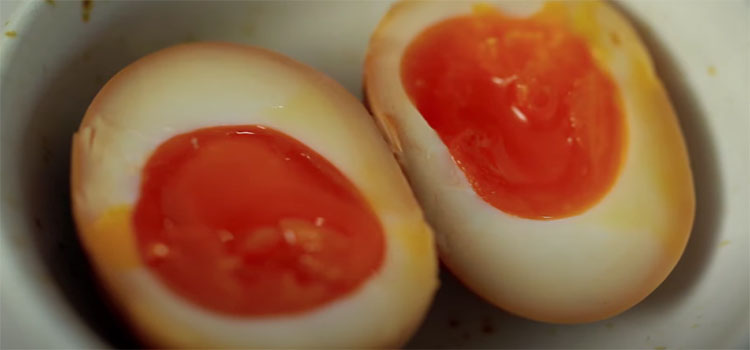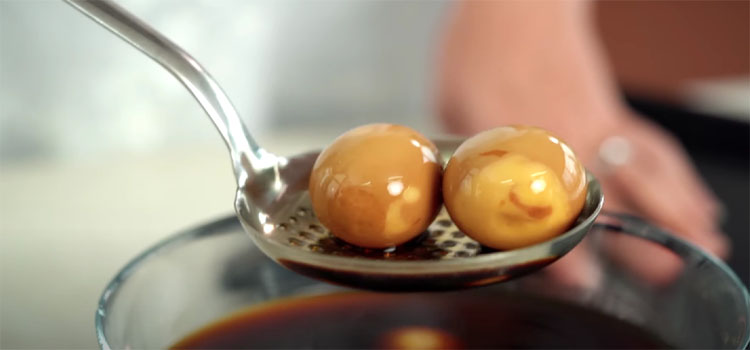Last Updated on September 15, 2024 by Shari Mason
Soy sauce-marinated eggs are a yummy delight. **But, how long do they keep?**
Today, I’ll share with you what I’ve discovered about the shelf life of soy sauce eggs, ensuring you can enjoy their scrumptiousness without any worries.
How Long Are Soy Sauce Eggs Good For?


After marinating, the eggs in soy sauce [2] can be kept in the refrigerator for approximately 3 to 4 days while maintaining their flavor and quality.
However, it’s important to note that as time passes, the texture and taste of the eggs may gradually change.
To truly relish their deliciousness, consuming soy sauce eggs within the first few days of preparation is recommended when they are at their freshest.
This ensures you experience the optimal balance of flavors and enjoy the velvety richness that makes them delightful. But how long can store-bought eggs sit out?
Can You Freeze Soy Sauce Eggs?
Freezing soy sauce eggs is possible and can be a convenient option for extending their shelf life. However, it’s essential to consider that freezing may alter the texture of the eggs.
“Don’t dunk your nigiri in the soy sauce. Don’t mix your wasabi in the soy sauce. If the rice is good, complement your sushi chef on the rice.”
– Anthony Bourdain, American Chef
When frozen, the yolks become slightly firmer, and the whites may become slightly watery upon thawing.
To freeze soy sauce eggs, place them in an airtight container or freezer bag, fully submerging them in the marinade.
When ready to use, thaw the eggs [2] in the refrigerator overnight and consume them within a day or two for the best quality.
But how do you keep hard-boiled eggs from smelling in the fridge?
Signs That It Might Have Gone Bad


- Foul odor: A strong, unpleasant smell emanating from the eggs clearly indicates spoilage. If the eggs emit an off-putting or rancid odor, it’s best to discard them.
- Mold or unusual growth: Inspect the eggs closely for any signs of mold or unusual growth. If you notice any fuzzy or discolored patches on the eggs, it strongly indicates that they have spoiled and should not be consumed.
- Sliminess or change in texture: If the eggs feel slimy or the texture has significantly changed, it is a sign that bacteria have increased and the eggs have likely gone bad.
- Off-color or unusual appearance: Pay attention to any drastic changes in the color or appearance of the eggs. If they appear discolored, have an unusual or cloudy appearance, or display any other visual abnormalities, it is best to err on caution and discard them.
- Unpleasant taste: When sampling a soy sauce egg, trust your taste buds. If the flavor seems off or unpleasant, with a firm bitterness or sourness, it strongly indicates that the eggs have spoiled and should not be consumed.
“Embrace the flavors of soy sauce eggs, but be mindful of their fleeting freshness. To experience their optimal taste and texture, indulge in their velvety richness within the first few days. “
– Eat Pallet Restaurant & Food Advice
Read: Are England’s Best Eggs Genetically Modified?
Tips On How To Store Soy Sauce Eggs
- Keep them refrigerated: Store soy sauce eggs below 40°F (4°C) in the refrigerator. The cool environment helps slow down bacterial growth and preserves their freshness. But how do you remove the chalaza from the egg?
- Use an airtight container: Place the soy sauce eggs in an airtight container or a sealed freezer bag to prevent them from absorbing odors or flavors from other foods in the refrigerator.
- Submerge in marinade: Ensure the eggs are fully submerged to maintain their flavor and prevent drying out. This also helps in preserving their moisture and texture.
- Label and date: If you have multiple batches of soy sauce eggs, it’s helpful to label the container or bag with the date of preparation. This allows you to keep track of their freshness and prioritize consumption accordingly.
- Consume within a few days: While soy sauce eggs can last for about 3 to 4 days in the refrigerator, consuming them within the first few days is recommended for the best taste and texture.
FAQs
u003cstrongu003eDoes soy sauce make eggs last longer?u003c/strongu003e
No, soy sauce does not make eggs last longer. While soy sauce adds flavor to the eggs, it does not have preservative properties that extend their shelf life. u003cbru003eu003cbru003eProper storage in the refrigerator is still necessary to maintain the freshness of the eggs.
u003cstrongu003eDo marinated eggs need to be refrigerated?u003c/strongu003e
Yes, marinated eggs should be refrigerated. Refrigeration helps to preserve the quality and prevent the growth of harmful bacteria.
Key Takeaways
Properly stored in the refrigerator, soy sauce eggs can typically last for approximately 3 to 4 days while maintaining their flavor and quality.
However, consuming them within the first few days is recommended for the best taste and texture. Pay attention to signs of spoilage such as foul odor, mold, sliminess, unusual appearance, or unpleasant taste.
By following proper storage guidelines and being mindful of freshness, you can relish the lusciousness of soy sauce eggs and elevate your culinary adventures.
So, savor their richness and indulge in their delights while they are at their prime, creating memorable moments of culinary enjoyment.
References:
- https://www.thespruceeats.com/what-is-soy-sauce-1328450
- https://www.hsph.harvard.edu/nutritionsource/food-features/eggs/
- Can You Put an AC Unit in the Kitchen? - September 27, 2024
- What Cheese Does Olive Garden Use? Discover Their Signature - September 27, 2024
- How to Cancel a Pizza Hut Order? Quick & Easy Guide - September 24, 2024


